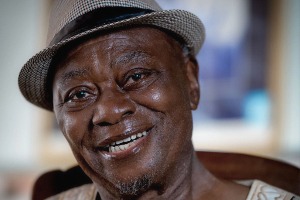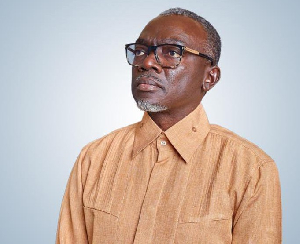One Dr. Edusei on Joy News file hosted by Samson Lardy Ayenini Esq. made comments to the effect that the Hon. Nominee for the Ministry of Fisheries need not speak English and once she could speak Ga or Twi and could interact with the fishermen she was good to go. Though a co-panellist, Mr. Bentil was quick to correct the erroneous impression the learned PhD holder sought to create on National Television, Radio as well as International Media, I am of the firm belief that he and others who think like him need some education.
The suggestion that the work of the Hon. Minister is limited to interacting with fishermen who do not appreciate the English language betrays the ignorance of the Doctor of books about the complexities within the sector, a situation that requires just a person who can speak Ga or Fante; even at that, we have fishing activities wherever there is a natural water body and in a number of instances backyard fish-farms and dug-out ponds. By implication, one may need to speak every Ghanaian language since fishing activities take place everywhere in Ghana.
Expected functions of a fisheries minister:
As an industry that has existed as long as man, fishers have interacted not just with Chiefs and Kings, but at least four of the 12 Disciples of Jesus Christ are known to be fishermen. Out of them the most trusted and the one upon whom he built his church. So anyone appointed to provide leadership in the sector must exhibit a sense of appreciation of the value of the fisherman in the eyes of the Lord.
In contemporary fishing, a Minister is enjoined to provide policy direction that will ensure that the sector becomes sustainable. The Minister needs to work with the Fisheries Commission in developing Fisheries Management Plan, Budget as well as constantly responding to issues in parliament; I am sure all this can be conducted in Ga and Fante.
Hon. Kwesi Ahwoi was the Chair of the Ministerial Conference on Fisheries Cooperation among Africa States Bordering the Atlantic (ATLAFCO) and it is expected that he chaired the conference speaking Ga and Twi? The Hon. Mike Akyeampong, then a Deputy Minister responsible for Fisheries when Fisheries was part of Agriculture Ministry was the Chair of Food and Agriculture Organization (FAO) fisheries wing, Conference on Fisheries (COFI) which convenes annually in the Italian capital, Rome. Our very own Prof. Emeritus Martin Tsamenyi a lawyer of great international repute also chaired the International Commission for the Conservation of Atlantic Tunas on Ghana’s recommendation. These are just but a few of engagement requiring a Minister or the assign from Ghana to engage in and I am sure the speaking of Ghanaian Language per Dr. Edusei understanding of whom a Fisheries Minister should be fit the purpose.
Ghana has an Illegal Unregulated and Unreported (IUU) working team with the European Union and meetings take place both in Ghana and in Brussels, Belgium regularly. I am sure such meetings can easily be conducted in Ga or Twi, aside the meetings with the World Bank and the various Diplomatic Missions on the cooperation between Ghana and many countries on multilateral and bilateral fisheries-related diplomacies.
STRUCTURE OF THE FISHERIES SECTOR IN GHANA
The Minister responsible for Fisheries has an ultimate responsibility to formulate implementable policies for a broad sector, employing about 2.3million people directly and indirectly and feeding at least 80% of the living in Ghana who has fish as part of their daily meals. This sector comprises;
1. Industrial Tuna
2. Industrial Trawl
3. Inshore (Semi Industrial)
4. Artisanal (marine) Canoe
5. Artisanal (Freshwater/Inland) Canoe
6. Aquaculture
7. Fish Imports
8. Processing Companies
9. Research and Academia
10. Training Institution
11. Auxiliary services (Transporters, Stevedores etc)
12. Labour
13. Market and local processors
14. Ministry and Commission Staff
Beyond these, there are activities within the maritime space as well as the riverine systems such as Hydrocarbon extraction, Mining (both legal and illegal), water transport, fibre optic cables all of which has interactions with the fishes and the activities of the fishing industry.
For the benefit of the learned Dr. Edusei, we would like to explain briefly some of the major activities that the Minister should interact with in Ga;
Industrial tuna sector
Ghana has part of the ICCAT community is required to comply by ICCAT regulations that are amended almost every year based on what the ICCAT Scientific Community assesses the stock levels of the various Atlantic species to be and the Total Allowable Catches, Fleet sizes and numbers allowed as well as areas and fishing methods. Ghana is a very important member of ICCAT as a leading producer of Tuna ranking in the first five with Japan, European Union, Brazil inter alia. Ghana per ICCAT regulation is allowed 37 Tuna Vessels which Gross Registered Tonnage (GRT) have already been recorded in ICCAT records and which must comprise 20 Pole and Line Vessels and 17 Purse Seine Vessels. Pole and Line Vessels only means the vessels do not use net in Fishing, they use fishing hooks on nylon lines attached to a pole. They bait the tuna with live anchovies (Keta School Boys) that are released into the water and whiles the tuna tries feeding on them, the sailors hook them.
The Purse Seine Tuna (Ring Net); uses fishing net of not less than 100mm mesh sizes that hang vertically in the water with floats at the top and the ends drawn to encircle the tuna. The only sector in Ghana, that the law allows a foreign participation of not more than 50% beneficial ownership.
Industrial trawl sector:
The trawl sector uses a dragnet drawn by a steel vessel (in Ghana of not more than 250GRT) on the bottom of the sea targeting mainly demersal species such as red snappers, groupers, barracudas, cuttlefish amongst others. These vessels are not required to fish within the 30metre contour debt or 6 nautical miles, whichever is further known as the Inshore Exclusive Zone (IEZ).
The inshore (Semi industrial) sector:
The inshore sector is mostly a medium wooden vessel with an inboard propelled motor that jointly have exclusive fishing rights with the canoes within the (IEZ), when engaging in purse seine fishing otherwise may trawl outside the IEZ. They can be found mostly in Tema, Moree, Elmina, Sekondi and Takoradi.
Canoe sector:
Dug-out wooden vessels for which Ghana now has over 12,000 according to the canoe frame survey dotted along the many landing beaches of the 550km Ghanaian Shoreline. They use many gear types which include, Beach Seine, Purse Seine, Hook and Line, Cast Net, Set Nets etc. This sector is the biggest employer within the fisheries sector and over 70% of all fish landing according to the 2015-2019 fisheries Development Plan. The sector has not seen much modernization apart from the gradual change from sails to outboard motors, sparing use of eco-sounders and fish finders. The sector is very much over capacitated just like the Inshore and Trawl Sector according to the World Bank.
Inland sector:
This sector is the largest by size and most widespread. The fishing activity happens on every riverine system, lake, stream and lagoons. It is from commercial scale to just recreational fishing and targets include fish, crustaceans and shrimps. This sector's contribution to the economy is very much dwindled because of the mismanagement of the fresh water and brackish water system. Water bodies have been polluted either through Industrial, Municipal or Domestic activities for which riverine system are used as sink waste for or receptors of waste. The decline in the contribution of the sector is a major reason Ghana currently imports more fish than it is able to produce for consumption demand of about 1million metric tonnes annually.
Aquaculture sector:
One of the biggest jokes Ghana has continually engaged in is developing a robust and vibrant freshwater aquaculture sector that will eventually contribute significantly in meeting the high demand for fish by ignoring the structures that build such a sector. It is a wonder how a country will be able to build an aquaculture sector when the health of our water bodies is of no material importance to the policymaker. We have allowed mining in almost every important water body, destroying the very base of the aquaculture industry. A number of lagoons are either taken over by aquatic weeds and being reclaimed for “development” and all wetlands gone significantly impacting on the biodiversity and the ecosystem that will support fish production.
I am sure Dr. Edusei will at this juncture have a better appreciation of the nature of industry and the challenges the industry faces for which a Ga of Twi speaking Minister is all that may be required to resolve.
The sector supports the two main fish processing companies, Pioneer Food Canner and Cosmo Foods. The sector provides job for many women engaged in the value chain as marketers, processors till the fish gets to his table.
Role of research and academia:
In any country where fisheries are considered important, research and contribution to the Academia is key. A number of fisheries schools and colleges, faculties are established and tooled to work with the industry. Fisheries Management is guided by the work of the researchers who work with industry players tapping into their Local Ecological Knowledge (LEK) to inform policy and develop management tools.
I have been privileged to be part of international meetings and observed the premium placed on research findings. At ICCAT, no decision is made on any tuna or tuna-like specie unless that decision is firmly rooted on research report from the Standing Committee on Research and Statistics (SCRS). In 2015, 2017 and 2019 I was privileged to be part of fisheries study tour of the New England Region, particularly the University of Rhode Island with industry players in 2015, with key government persons, Deputy Minister, Chief Director and Executive Director in 2017 and with a section Parliamentary Select Committee on Food, Agriculture and Cocoa Affairs in 2019. The tours gave all participants useful insight into fisheries management and the role science play. On two of the visits, we were privileged to observe the US Fisheries Commission in session and it is worthy of note that it was open to the public, scientific and research presentations were made by the key researchers to inform fisheries management decisions and most importantly, at least we heard not less than 50% of Commission members have their names prefixed with Doctor (PhD).
You will need a Minister to appreciate the significance of research findings, read them with some basic comprehension and make clear policy decisions that he/she can defend with certainty in cabinet and parliament.
Ghana with the support of the USAID/Sustainable Fisheries Management Project attempted to establish a Scientific and Technical Working Group (STWG), with the late Prof. Emeritus Yankson as the chair. It is suffering financial challenges because apparently the powers that be do not see the need to support and nurture it. That is what happens when there is no passion and appreciation as well as education on a sector.
Labour in the sector:
We all agree that the fisheries sector contributes a lot in terms of labour, employing a lot of young people who generally end up with very little to show by the time they should retire. The sight of many old fishers perceived in their youth as some promising fishermen is a worry for a lot of younger fishermen who only see a bleak future.
This is a major national security risk especially with declining catches, increasing fleets and diminishing fishing grounds. The youth in the sector with long sea endurance will be ideal tools in the hands of the devil looking at crimes such as piracy, robbery, drugs and others reeling their ugly heads in our part of the globe. It is therefore not about talking to fishermen in language they understand, is about developing policies that will evolve the sector, reduce dependency on the downstream and improve the upstream.
US with a population of over 328million people as at 2019 with vast oceans in the Atlantic and Pacific employs, 1.74 million people in the fisheries sector that sell some US$244 billion annually and value addition of US$110.7 billion. Ghana with a 30million employs over 2million people in the fisheries sector which contributes some US$1billion and insignificant value addition.
The reason we need as a country to be minded by who leads the sector and why the person should be adequately knowledgeable in the subject matter, have clear policy direction, understand the fisheries economy and turn the sector around. It is no longer about premix sales and distribution of outboard motors. It is livelihood and national and human security issues as well.

International:
In the USA as shown above, by the National Oceanographic and Atmospheric Agency (NOAA), the Economic Impact of Fisheries in the US in 2017;
Jobs; 1.74 Billion
Sales: US$244.1 Billion
Norway's export revenue has always been dependent upon the marine resources that long coastline provides. According to a speech given by the governor of the central bank of Norway, Øystein Olsen, sale of fresh and processed fish constituted 39% of the export revenue in 1835, while 25% came from shipping services. More than a century later, in 1966, shipping represented roughly 40% of Norway's export revenues, but fisheries were still an important contributor to; almost 5% of the export revenue came from fish and processed fish. Later, the oil and gas industry became the most important sea-based exporter. Today, Norway is the world's second-largest exporter of fish and seafood with an export value reaching NOK 94.5 (USD11.16) billion in 2017. This is the highest export value ever seen within the industry and while petroleum revenue constitutes 38.5% of the export revenue, fish and seafood stand for 7.9% (Source: Marine Policy Volume 110, December 2019, 103561)
From the examples above it is clear, the fisheries sector, which was first made a standalone Ministry in Norway in 1946 cannot just be taken for granted as we are trying to do in Ghana. We need to tackle that sector with all the seriousness it deserves to derive maximum benefits.
Conclusion
Let’s conclude by reminding Dr. Edusei that the debate is not about the brilliance or otherwise of the nominee in the fluency in English language, far from that. The nominee has absolutely no knowledge in an industry that is so important yet comatose. I asked the question if Ghana is a private company of Dr. Edusei and Parliament is the board with the vetting committee as an interview panel, the Hon. Nominee applies to be a Directorate in his directorate responsible for policy in fisheries sector and he sees that interview;
1. Will he ask the interview panel to recommend her?
2. Will he ask the board to approve her?
3. Will he employ her?
Opinions of Monday, 22 February 2021
Columnist: Richster Nii Amarh Amarfio



















